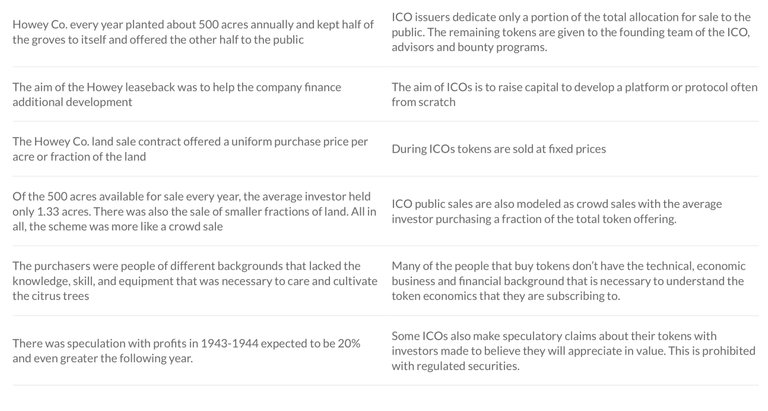
How The Howey Test Came About
The Howey Test was born in 1946 when a case involving the SEC v. W.J. Howey Co. had to be settled in the Supreme Court. The lawsuit involved the Howey Company based in Florida – a citrus farm that operated on a large piece of land in the southern portion of the state.

In a bid to raise more funds for additional development, the company decided to lease out half of the farm to visitors. The company targeted tourists who were staying at a hotel owned by Howey Co. and sold land plus service contracts for producing, harvesting and marketing citrus fruits in Lake County, Florida.
The SEC sought to understand if the land purchase plus the service contract had created an investment contract. According to the Securities Act of 1933 and the Securities Exchange Act of 1934, any transaction that qualifies as an “investment contract” can be considered as security, and this means they are subject to specific requirements with disclosure and registration.
The court would eventually agree that the agreement was an investment contract and come up with the Howey Test to determine whether things that don’t look like securities can, in fact, be seen as securities.
The test comprises of three components
- There is an investment of money
- The investment comes with the expectation of profit
- The expectation of the profit is based on the efforts of others
The court determined that since the purchasers of the Howey land had no “knowledge, skill, and equipment to care and cultivate the citrus trees,” they acted as speculators. They bought the property based on the assumption that it would generate a profit for them as a result of the efforts of other people.
The court would also determine that the transactions involved in the case were indeed investment contracts since the company was offering something more than simple interests in land, they were providing an opportunity to contribute money, and in return, they would get a share of profits of a large citrus fruit enterprise.
Eventually, the company was found in violation of the law for failing to register the transactions with the SEC.

Comparisons between The Howey Fact Pattern and Modern day ICO fundraising
Over the years the Howey Test has been used to determine regulatory oversight. It has specifically come into play over the past few years as cryptocurrencies have become more prominent. Using the test, the SEC seeks to understand if crypto investors are participating in a speculative enterprise. And if this is the case, if the profits they are expecting are dependent upon the work of a third party.
Let’s have a look at a few comparisons between the test and the ICO model.

Examples Of The SEC Using The Howey Test To Judge An ICO
In the past, the SEC has used the Howey Test to determine that the DAO ICO transactions were indeed securities. DAO was a “Decentralized Autonomous Organization” that had been created by Slock.it UG – a German corporation.
The organization was designed to operate as a for-profit entity whose assets were supposed to fund other blockchain projects based on a voting system. The public offering lasted for a month and managed to raise 12 million Ethereum tokens worth $150 million at the time.
Even though the SEC had previously never investigated such an enterprise structure, the agency used the principle of “form over function” to argue that the economic realities made this case similar to an investment in the common enterprise.
“Some of the most important languages in Howey surrounds the concept that US securities laws embody flexible rather than static principle[s]…that [are] capable of adaptation to meet the countless and variable schemes devised by those who seek the use of the money of others on the promise of benefits.” [Howey p. 299]
So... Are All Cryptocurrencies Securities?
Currently, two types of tokens exist; security and utility tokens. Security tokens offer their holders’ ownership rights in a company. According to the Howey Test, this makes clear security since there is an investment of money and a profit is expected. Also, the gain is based on the labor of others (if the project is to succeed).
However, determining if utility tokens are securities can be harder. Utility tokens usually represent a unit of account within a network. The more the system grows so does the utility of the token. As the network grows in size so does the transaction volumes, and this increases demand for the tokens.
So, answering the question if utility tokens are securities? The first rule of the Howey Test is satisfied since there is an investment of money. There is also the expectation of profit. And even though a utility token may not represent shares in a company, they usually grow in value.
This will lead to profit in the future for token holders which also satisfies the second Howey rule. Finally, profit is also based on the labor of others. Therefore, all the rules are satisfied which means utility tokens are securities as well.



"Therefore, all the rules are satisfied which means utility tokens are securities as well."
I think ico's are just a modern way of doing fundraising. That's exactly the reason why most do an ico in the first place. A lot of project don't need blockchain technology they just need the funds. But since blockchain was the buzzword of 2017 it was the fastest way to get some money out of the pockets from mom and pop investors. You just had to mention artificial intelligence and blockchain technology a few times and boom, magic happens. People suddenly start throwing money at you.
People love fairy tales, the crazier the story the more money they throw at you.
It's sad that scammers take advantage from that. But on the other hand, what do people sometimes expect. Some thought they would become rich in a few months time with only a minimal investment and no knowledge about what a blockchain actually is.
I feel sorry for the people who bought in december 2017 but it's their own stupid fault. If people would start to use their brains all the scammers won't to do shitty ico's because nobody would be buying them.
There is a demand for shitty ico's so scammers give them some supply. As long as people don't learn their lesson history will just repeat.
(I'm going a bit off topic i know)
It still amazes me to this day how the masses are always wrong about things. I thought investors would be more rational human beings. Wtf is wrong with people? Enlighten me plz if you know the answer.
I've came to a point that i just always do the opposite of what the masses are doing. And it works great actually, you would be amazed.
Congratulations @icodog! You have completed the following achievement on the Steem blockchain and have been rewarded with new badge(s) :
You can view your badges on your Steem Board and compare to others on the Steem Ranking
If you no longer want to receive notifications, reply to this comment with the word
STOPTo support your work, I also upvoted your post!
Do not miss the last post from @steemitboard:
Vote for @Steemitboard as a witness to get one more award and increased upvotes!